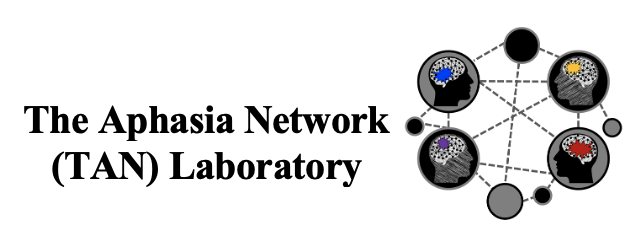Neural Bases of Longitudinal Cognitive-Linguistic Outcomes in Aphasia
A Virtual Tour of This Study
Please check out this video to learn more about this study!
AKA The Cap Study
What is this study about?
Aphasia (due to stroke or progressive disease) affects someone’s ability to communicate and often greatly impacts quality of life. The goal of this study is to better understand how brain and language skills change over time in people with post-stroke and primary progressive aphasia. In this study, we particularly focus on early post-stroke recovery (< 4 months after onset).
What does this study involve?
The study includes two study time points approximately 3-5 months apart. Each study time point includes ~2-5 two-hour sessions to complete cognitive tests & non-invasive brain imaging including functional Near-Infrared Spectroscopy (fNIRS) and if eligible, magnetic resonance imaging (MRI).
Who can participate?
Adults (18+ years of age) with OR without a history of stroke or a diagnosis of primary progressive aphasia can participate.
Help reseachers improve assessment or treatment for individuals with aphasia in the future
Help researchers better understand how changes in brain function over time relate to brain damage and changes in language skills in adults with aphasia
Where does the study take place?
MRI sessions occur at the Northeastern University Biomedical Imaging Center. Everything else can take place at The Aphasia Network Lab at Northeastern University or in the comfort of your home!
Why participate?
1. Adults (18+ years of age) with OR without a history of stroke or a diagnosis of primary progressive aphasia can participate.
2. Help reseachers improve assessment or treatment for individuals with aphasia in the future
3. Help researchers better understand how changes in brain function over time relate to brain damage and changes in language skills in adults with aphasia

Brain imaging with fNIRS involves placing a cap on the participant’s head. The cap is safe and comfortable to wear.

Before starting an fNIRS experiment, the study team checks signal quality

Lab director Dr. Erin Meier and lab coordinator Leanna Ugent discuss fNIRS study results.
Approved By Northeastern IRB, protocol #21-06-11
Funded by NIH/NIDCD 1R21DC020546, PI: Erin Meier
Contact us if you’re interested in participating!
We’re also happy to answer any questions!
